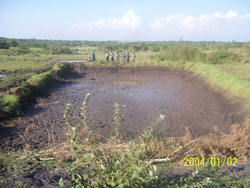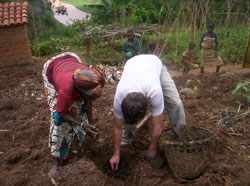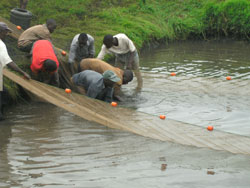Pumpkins for Peace
Published: April 13, 2021
This is a story about piglets, a fishpond, pumpkins and peace, and it begins in East Africa.
When Travis Hall 09 traveled to Uganda eight years ago to study abroad with GO ED., he didnt expect to return at semesters end with an honorary plot of land bearing his name and a close Ugandan friend.
Upon arriving in the capitol city of Kampala, Hall met Jumah Wangira, a Ugandan college student tasked with helping him navigate an unfamiliar city and culture. They became good friends. Hall accepted an invitation to visit Wangiras family in Lumino, near the Kenyan border, and returned several times over the course of the semester. He learned of the familys dream to build a series of fishponds that would lessen the impact of depleting fish in nearby Lake Victoria. The pond would also provide jobs and food for their friends and family. As Wangira and Hall planned, their excitement and friendship grew.
Halls studies included an internship with Food for the Hungry, an organization that distributed pairs of pigs to local villages. The program gave a male pig to one family and a female to another, and provided training on animal husbandry. The two families worked together raising piglets to sell, often offering piglets and training to other families in their village. Hall visited these villages to interview participants and collect stories of their improved lives.
The project was an economic success, but Hall was more impressed with the intangible effects of community building on villages recovering from ethnic violence. The pigs became this medium for bridging relational divides, he said.
Bearing witness to the reconciliation was transformative for Hall. In East Africa, exchanging gifts of livestock symbolizes the formation of lasting relationships. Working together to grow food and create economic opportunities can produce unexpected consequences, said Hall. Realizing that changed my life.
As he prepared to return home at the end of the semester, he contemplated how he could integrate what he learned abroad in meaningful ways. Before leaving, he visited Wangiras home one last time. As they walked, Wangiras shoe broke. Hall gave him a pair of shoes from his luggage. Later, as Hall left, Wangira said the family had set aside a plot of land for him on their farm with a hut and garden on it.
Hall was overwhelmed by the gesture. Back home, encouraged by family, friends and his professors, he determined to continue his friendship with Wangiras family. I focused on learning to live with integrity in response to all the things Id witnessed, he said, to reorient myself and live in solidarity with my Ugandan friends and my community in Greenville.
That spring, Hall decided to practice sustainable agriculture by growing a pumpkin patch. Professor Rick McPeak gave him space on his Greenville property. Hall traveled to commercial pumpkin farms and learned about pruning, water requirements and cultivation techniques. Friends helped him clear the land, and he tended 200 pumpkin plants over the summer.
Halls Pumpkin Patch of Peace in Greenville grew in tandem with the developing Fishpond Peace Initiative in Uganda. That fall, Hall and Anna Wagner 09 sold pumpkins at farmers markets and community events like the chili cook-off, hayride and concert they organized. In all, they raised $2,000, enough for the Wangiras to rent a backhoe for digging the pond and purchase nets, a pump, lime, and fish food. In a sense, the people and land of Greenville had joined the villagers and pond in Lumino. Their first harvest filled fishnets with tilapia and catfish.
Today, the fishpond is a focus of village life. It includes a Peace Center for community events. When hundreds of Kenyan refugees crossed the border, the villagers welcomed them to camp at the fishpond. Before long, the refugees took up shovels and started work on another fishpond. They planned a peace rally and an unofficial peace talk among fighting tribes.
Travis and Anna married after college. He worked as a horticulturalist and nurtured a passion for plant conservation and land stewardship. She worked as a case specialist for Cuban refugees. They now live in Kigali, Rwanda, where they are student life coordinators for GO ED. The role suits them well. Among other service efforts, the Halls GO ED. students engage in community gardening. They study garden design, soil composition and moisture control. They also experiment with planting raised beds, efficient kitchen gardens and space-saving vertical gardens.
The Halls do what they can to prepare students for the adjustments they will face when they leave Rwanda. They encourage students to find new ways of building relationships and applying what they learn once they return home.
I am always surprised at how relational that process can be, says Hall, whether its artistic, economic, biological or political. He points to Scripture and reminds students, You cant put new wine in old wine skins. At the same time, he gives them hope born from his experience with pigs, ponds and a treasured Ugandan friendship. He and Jumah remain partners and continue to develop the project in Lumino.
This story was originally published as a web extra for the spring 2014 edition of The RECORD.
